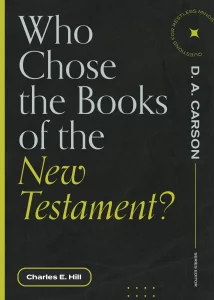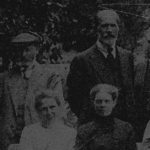
In this excerpt from Who Chose the Books of the New Testament?, Charles Hill examines the historical political pressures surrounding the canonization of the New Testament.
In the ongoing interaction of Christianity with its surrounding culture, the issue of how we got the Bible has become one of the flashpoints of our day. The popular narrative that has sprung up and taken root has become so often repeated, so widely adopted, and its explanatory power has become so effective, that it could probably now qualify as one of our cultural myths: a grand story that serves to explain for a culture a set of phenomena important for its self-understanding. Such a grand story must be simple in its broad strokes, but have enough historical correspondence to make itself plausible to great numbers of people.
Why is such a story about how we got the Bible needed as part of our cultural mythology? That Christianity and its Bible have played a highly prominent role in the history of Western culture is obvious and unavoidable to anyone who studies history. In times when the influence of Christianity is not so seriously questioned, the need for an explanatory myth is perhaps not felt so strongly. But today many would see the cultural landscape quite differently, regarding the remaining effects of Christianity as the final flickerings of a failed human experiment, already in its twilight hours. Our culture apparently needs a myth, then, not to account for its distinctively Christian character, but to explain its onetime fascination with an increasingly discredited religion. It needs to explain how it was that Christianity—not Islam, Judaism, or Hinduism, not secular Humanism or Atheism, but Christianity—came to play the elemental role it has in Western, and particularly in American, culture.
Encounters with the Cultural Myth
The simple and popular form of the myth is perhaps stated no better than the way Dan Brown gives it in a conversation in The Da Vinci Code.
“Who chose which gospels to include?” Sophie asked. “Aha!” Teabing burst in with enthusiasm. “The fundamental irony of Christianity! The Bible, as we know it today, was collated by the pagan Roman emperor Constantine the Great.”
So, Constantine chose the New Testament books.
I’ve become fond of telling how a professor in one of my son’s classes at the University of Florida asked his students, almost in passing, if anyone knew who it was that chose the books of the Bible? One student’s answer fully satisfied his instructor: “The people with the biggest army.” So, the people with the biggest army chose the New Testament books—and indeed, Constantine would have had the biggest army at the time.
People on airplanes, people at Starbucks, tell me the same story or some version of it. It was Constantine who was the key “chooser,” and he and the bishops he assembled for the Council of Nicaea in AD 325 (backed, of course, by the biggest army) assembled the Bible as we know it today. Others who have dug a bit deeper, perhaps read a book or taken a college course, may put a finer point on it and say that it was really Athanasius, bishop of Alexandria, who in the year 367 was the first to specify all twenty-seven books of the New Testament. What everyone seems to agree on is that it was a state-sponsored, state-aligned Christianity in the fourth century, fully three centuries after Christ, which chose the New Testament books. The Bible was put together after Christianity had become wedded to the state, and people, societies, and civilizations have been struggling to extract themselves from the perceived entanglements with Christianity and its politically constructed Bible ever since.
Christians who regard the Bible as in any real and transcendent sense the word of God might want to comfort themselves with the thought that this is a myth of Christian origins that has spread only on the popular level, through novels and films, and, yes, the occasional college classroom. Serious scholars and other informed people know it isn’t true. The funny thing is that many scholars are sounding a lot like the popularizers. In fact, some of the scholars, like Elaine Pagels of Princeton, Bart Ehrman of the University of North Carolina at Chapel Hill, and others, are the popularizers. “The Christian canonization process,” writes scholar David Dungan in his popular book Constantine’s Bible, “involved a governmental intrusion into what had been a scripture selection process.” Dungan regards the Christian creation of a canon of Scripture as “a unique development in the world’s religions, found for the first time in fourth- and fifth-century Romanized Catholic Christianity.”
There is of course a long history between the time of Jesus and the critical events of the fourth century, the rise of Constantine, the eventual establishment of Christianity as the state religion, and homogenizing councils like the Council of Nicaea and others. In the minds of many scholars today, the one word that characterizes the entire intervening era perhaps better than any other is the word “diversity.” Christianity from Jesus to Constantine, you might say, could be described as a very loose and largely uncoordinated movement of diverse groups with varying theologies, all vying for converts in the Greco-Roman world. Some groups were better organized than others, but no group had a majority; no group—from an objective and purely historical viewpoint—should be said to have had a better claim than any other to being the true representative of Jesus and his first followers. In this period we are more to speak of Christianities than of Christianity. What is now commonly referred to as the “proto-orthodox”—a term coined on the belief that there was no such thing as orthodoxy before the fourth century—was merely one of many Christian groups competing for followers.
If it is true that the books of the New Testament were chosen and assembled under deep political pressure, only after one version of Christianity had achieved victory over its many rivals, what then? Clearly there are many who see this story as a crippling embarrassment to Christians and as another tool by which to marginalize Christianity today. (The marginalization of Christianity would, by the way, qualify as a political end.) But is this necessarily so? Embarrassing as it may be, it would not defeat or delegitimize Christianity. If the books of the New Testament were assembled by hook and by crook, the books were still assembled, and God, according to Christian theology, was not left out of the process. In fact, as the biblical patriarch Joseph told his brothers who had sold him into slavery and abandoned him, “You meant evil against me; but God meant it for good, to bring it about that many people should be kept alive, as they are today” (Gen 50:20). If this culturally useful narrative about the formation of the Bible turns out to be accurate, the Christian can still look gratefully and joyfully at the saving message preserved in the New Testament and say, “Constantine and his army may have meant it for evil, but God meant it for good, to bring it about that many people should hear the life-giving voice of Jesus in the books that made it into the New Testament.”
The ultimate issue with the political approach, then, is not that it poses some insuperable theological problem for Christianity (as some surely think). The issue is, is it true?
This post is adapted from Who Chose the Books of the New Testament? by Charles E. Hill (Lexham Press, 2021).
The Questions for Restless Minds series applies God’s word to today’s issues. Each short book faces tough questions honestly and clearly, so you can think wisely, act with conviction, and become more like Christ. Edited by D. A. Carson, the 17 volumes in the series cover a wide range of topics centered around critical questions many Christians wrestle with today.







